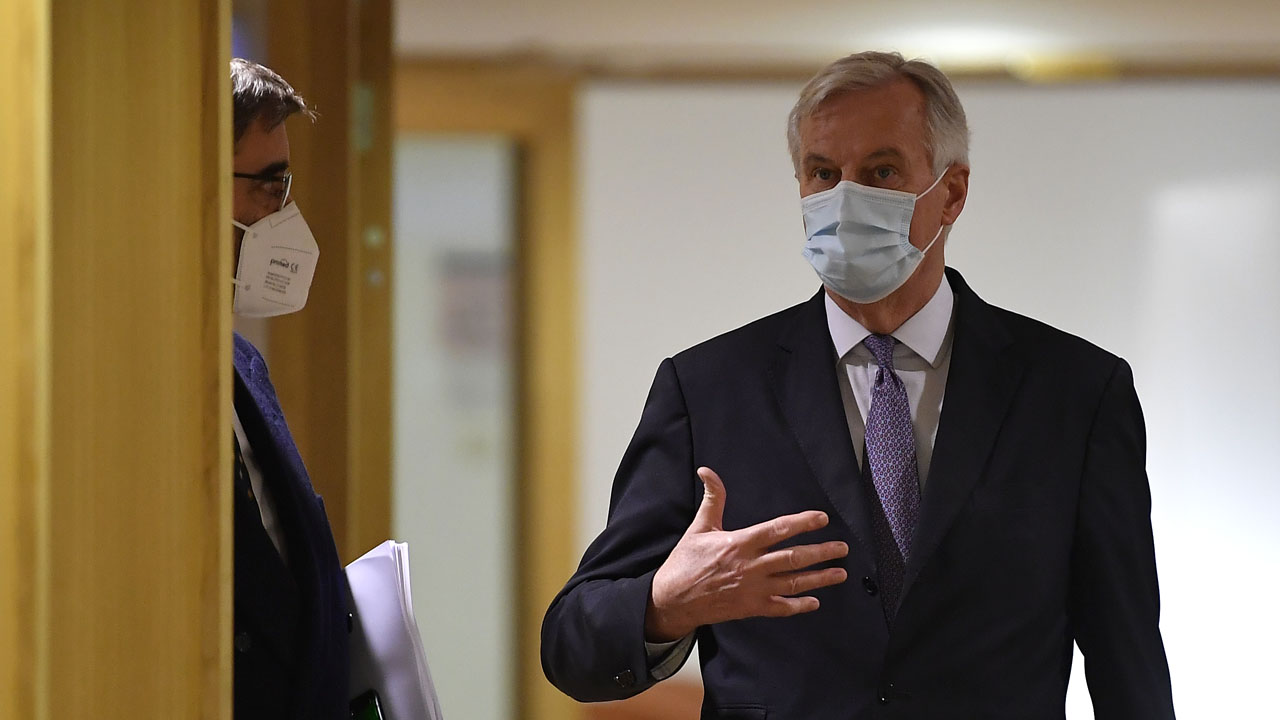
European Union’s negotiator Michel Barnier arrives for a meeting of the Committee of the Permanent Representatives of the Governments of the Member States to the European Union (Coreper) in Brussels on December 22, 2020. (Photo by JOHN THYS / POOL / AFP)
The European Union and Britain could agree on the terms of a post-Brexit trade deal within hours, European sources said Wednesday, as negotiators sought to hammer out the last details.
“We are in the final phase,” one EU official told AFP. Asked whether this meant a deal later Wednesday, a source close to the talks said: “Very likely, yes.”
The British pound surged against the dollar on optimism that a deal could finally be reached, with sterling rising to $1.35 around 1551 GMT. The pound also gained against the euro, which stood at 90.16 pence.
Diplomats from EU member states, which would have to approve any technical agreement, were less optimistic, however, warning that they still needed to see a text and that problems may remain.
But, a definitive breakthrough on ten months of tortuous negotiations seemed close, after EU chief Ursula von der Leyen and Britain’s Prime Minister Boris Johnson took control of the talks.
The last-gasp deal, if it is reached, would come just days before Britain is set to leave the EU’s single market at the end of the year, sparing the two sides from trade tariffs.
Any agreement still faces a race to be signed off by the EU’s 27 member states before Britain ends a half-century of economic integration with the continent at midnight on December 31.
A deal — which would still need to be translated and tidied up by lawyers — could be approved provisionally before the cut-off date and then scrutinised by EU lawmakers in the new year to avoid a cliff-edge.
Empty nets?
The focus in talks had shifted since Monday to cross-Channel calls between Johnson and von der Leyen after exhausted officials failed to close the gap on how to share access to UK fishing waters.
The remaining differences between the two camps were narrow but deep, in particular over fishing, with EU crews facing a dramatic cut in their catch from British waters.
London has pushed to reduce EU fishing fleets’ share of the estimated 650-million-euro annual haul by more than a third, with changes phased in over three years.
The EU, in particular countries with northern fishing fleets like France, Denmark and the Netherlands — was insisting on 25 percent over at least six years.
EU negotiator Michel Barnier briefed ambassadors and then senior MEPs on Tuesday that he had made his last offer on fish and that it was now up to political leaders to decide.
“Progress has been made. Most issues are preliminarily closed or close to being agreed,” a senior diplomat said, recounting Barnier’s briefing to EU envoys.
“However, differences on fisheries remain difficult to bridge. Unfortunately, the UK is not moving enough yet to clinch a fair deal on fisheries.”
Narrow path?
Brussels was ready to negotiate until the end of the year — or even “beyond”, as Barnier suggested — but time was running out for any deal to be provisionally applied.
EU members agreed to keep talking, but one diplomat warned: “Barnier was unable to tell member states whether there would be a deal tomorrow, before Christmas, the New Year or summer 2021.
“Also a narrow path might in the end prove a dead end,” he said
A colleague from another member state earlier suggested that if there was no breakthrough on Wednesday talks could resume next week.
If Barnier and his UK counterpart David Frost fail, the UK will leave without a follow-on trade deal.
Tariffs would be reimposed on cross-Channel trade in food and goods, exacerbating the economic shock of a return to a customs border after 47 years of integration.
Britain and France experienced a foretaste of what the chaos might look like this week, when France abruptly closed its borders to British trucks, trains and planes.
Paris was responding to concerns about a new coronavirus variant spreading in Britain, but the huge queues of trucks and threats of supply shortages were taken as an ominous sign.
Both London and Brussels insist they are ready for a return to tariffs and a customs border — but business groups are sounding the alarm about the possible disruption to come.





127130 286243Some genuinely superb info , Sword lily I identified this. 877530
507660 724963Great job on this write-up! I genuinely like how you presented your facts and how you created it intriguing and effortless to understand. Thank you. 473579
485677 933114Cheapest speeches and toasts, as nicely as toasts. probably are created building your personal at the party and is going to be most likely to turn into witty, humorous so new even. best man toast 571890